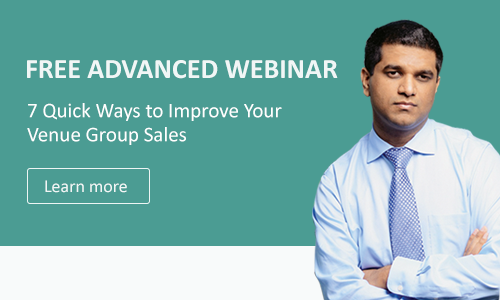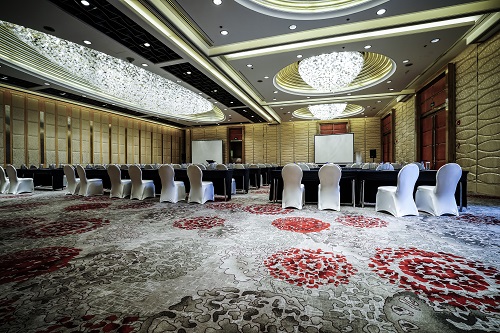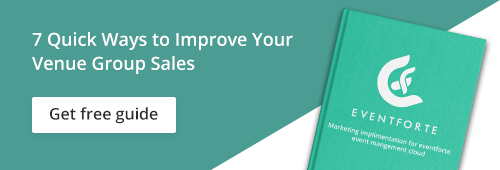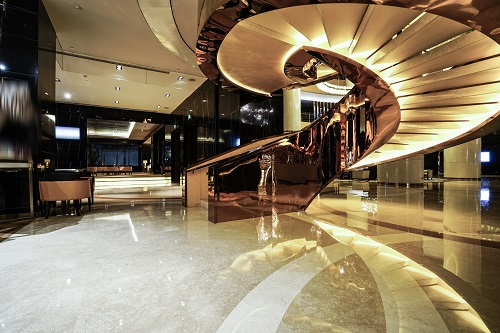EVENT VENUES ALERT: HOW WE INCREASED CONVERSIONS BY 64% WITHOUT SPENDING MORE ON ADS
If you own an event venue or work at an event venue, there’s probably one thing that is constantly on your mind: how do I get more sales?
And the thing is, if you look at any breakdown, usually the area that is lacking with most event venues is their group sales. Why is this?
Well, there are a number of factors. There are fewer distribution channels, it’s harder to target groups, and so forth.
But if you really get down to it, the biggest problem is that there just isn’t a good methodology for targeting groups or making group sales. It just hasn’t been done the same way it has been done for overnight sales.

But that’s ok! We are here to help. That’s why we’ve created a webinar on the 7 Quick Ways to Improve Venue Group Sales.
And here, we’ll go over some of the points from that webinar, so your event venue can stand out from the crowd. And as we point out in the webinar, it doesn’t matter if your event venue is large or small, traditional or alternative, or your position within the event venue or even if you are just a hospitality student. So everything we go through here and in the webinar will be useful to you.
1. EVENT VENUE INCREASED SALES: THINK LIKE AN INVESTIGATOR
So before you look at what to do to help your event venue, you need to take a step back. You need to get to know your event venue.
What do I mean by this?
You need to know everything you can about your event venue. What are your high seasons and your low seasons, for instance. Those are going to be different if you are a resort or business-oriented.

These are the kind of things you have to identify. Look at other event venues like your own, within the same segment. Let’s say your busy season should be the summer months, June, July, and August.
But what if your group sales in July are down a lot?
Well that’s a problem. There’s definitely something you can improve there.
But of course it goes deeper than that.
One of the main pitfalls many event venues have with their group bookings is their RFP process. The problems can come either with not enough RFPs or ironically enough, too many RFPs.
Yes, you can have too many RFPs.
If you aren’t performing good lead qualification techniques, you can be inundated with RFPs and not know which are the good ones and which are not so great.
So what’s one way to improve the RFP process if you aren’t getting enough RFPs?
Make it easier for customers to submit RFPs. I can’t stress this enough!
Right now, RFP pages are a mess. They ask for way too much information. So make the RFP process simpler. You can still qualify your leads without having to make the process complicated to the end user.
We have a number of suggestions for how to make the process simpler so to find out more, check out the webinar where we go into a lot of detail on this subject.
But let’s go into the opposite problem I brought up: too many RFPs. To solve this problem, you’ll also have to watch the webinar 🙂 but I’ll give you a hint:
You can use a lead qualification tool such as ours where you just need to put in an email address and boom, you can see if the lead is a good one or not, including factors such as estimates on willingness to pay.

But there’s more to it than just simple software. You have to know your Key Performance Indicators (KPIs). This is a well known term in the marketing world which lets you know which metrics in your industry really matter. And this goes back to being an investigator where you have to know about your event venue and your industry as well as you possibly can.
One metaphor we love is that of an iceberg. An iceberg generally juts out above the water but what you don’t see is that under the water is where most of the iceberg lies. It’s the same thing with your leads.
When you see a problem (the iceberg), many times, you only see the tip of the iceberg. But to really get at the heart of the problem, you need to drill down “below the water” to see what is really going on.
So one thing you can look at, to drill down below the surface, are your reports which many event venues generate showing metrics. Looking at things like average daily rate (ADR) and RevPar can really help you know what is going wrong.
And remember, the different segments are tied together. You may be asking, if you’re a bigger event venue with overnight rooms like a hotel, why do those overnight rooms for group bookings? These things are intertwined.
If your overnight rooms are not doing well, that will affect how you price group bookings and how you will approach group bookings.
And there’s one area that many event venues neglect entirely: their web traffic!
I can’t tell you how many times I’ve talked to venues who don’t use fundamental (and most importantly, free) tools on the internet to attempt to get to know how popular their venue’s site is on the web.

For instance, Google Analytics is extremely useful in monitoring online traffic.
There are a bunch more tools we talk about in the webinar, most of which are free. And these will all help track your web traffic, social media engagement, and just getting to know your customers.
So really, being an investigator is just about getting to know your venue. Look at things as they are now and that will help you figure out where you want to be. Because just wanting to get more sales is not enough. You need to know what time of the year you need more sales, why you aren’t getting more leads, and how you can increase web traffic, and so on!
But of course, to learn more, check out the webinar where we go into much more detail on all these subjects!
2. EVENT VENUE INCREASED SALES: THINK LIKE YOUR CUSTOMER
Next in the ways you can improve group sales for your venue is to think like your customer.
So what does that mean?
It means to put yourself in your customer’s shoes and think to yourself: what would my customers like?
We’ve noticed countless times that many venues get frustrated or even angry with their customers. You can’t do this.

If you want to make headway with your customers and get more group sales, you have to adapt to what your customers want.
And this goes back to thinking like an investigator and looking at your website. Did you know that 70% of meeting planners research venues online before deciding whether or not contact a sales person?
So in this short example, what does this tell us?
It means that if your website does not look good and is not intuitive, if it does not have all the necessary information that meeting planners are looking for when sourcing venues, they are simply not going to book with you, let alone give you a lead.
So if you aren’t getting much traffic to your site in the first place, it means you are doing something wrong. But don’t worry, we’re here to help.
In the webinar, we go into more depth into the different things meeting planners are looking for on your venue’s website but you get the idea: you have to give them what they want.
But it’s not all about your website of course.
There are plenty of other considerations you need to take into account.
For example, many times we hear about sales people not dealing with stakeholders. They may perform a site tour with a junior meeting planner or a relative of the client. These are not good ideas. Why not?
Think of it this way: you only have so many hours in the day. Taking the time for a site tour is a huge expense to you and your venue. You need to make sure that on site tours, you are dealing with the stakeholder. In other words, you need to be with a decision maker, who on the spot, can decide whether to book your venue or not.

How many times have you given a site tour to someone with no decision making power, and you thought it went really well, but then you never heard from the customer again?
So always remember to figure out very early on if you are dealing with a decision maker. This is part of the lead qualification process.
We go into this way more in the webinar, but one last piece of advice for dealing with customers and putting yourself in their shoes: always be transparent.
We’ve all had the experience where we were dealing with a salesperson and it turned out at the end, that the goods (or services) were not as advertised. When a customer feels cheated or scammed, that customer will not be a returning customer and may leave negative reviews everywhere about you and your venue. It’s not good for anyone.
Transparency is the long game. When you are up front with a customer about how much space you have, what the actual price is with everything included, you create a more trustworthy relationship with a customer. As a side benefit, you also can save a tremendous amount of time by having everyone on the same page at all times.
One additional way to help with this transparency is the use of virtual tours. By giving your customer a virtual tour, the customer can get a sense if their event will truly work within your venue and the different configurations that can work.

And ultimately, what you are trying to do is lead your customer to the finish line: the close. It’s called the selectosale, where no matter what option your customer chooses, you can lead them to the point where you close the sale and they get what they want.
To learn more about the selectosale, you can check out more in the webinar.
3. EVENT VENUE INCREASED SALES: THINK LIKE A TEACHER
Transparency doesn’t just work because it’s what your customer wants. It also works because being transparent is the best way to educate your customer.
Educating your customer efficiently and effectively is a great way to nurture relationships and get ready for the close.
If for no other reason, transparency is also great for your Net Promoter Score (NPS). We go into much more detail about what the NPS means but the bottom line is that the higher the score the better. And if you are transparent and have a high NPS, it means that your customer is going to say great things about you. So even if you don’t get the close immediately, they may appreciate your transparency so much that they recommend your event venue or use you for another event.
Like I said before, it’s the long game but it works.

Did you know that the major reason a customer would choose one service over another is not price but indifference. 65% of people rank indifference as the main factor for why they may leave a service over another. What do I mean by indifference? I mean when a salesperson doesn’t really care about you and just cares about how much you are willing to pay.
If you come across as genuinely caring about the needs of the customer, that you are not indifferent, you are more likely to close the customer and to have a repeat customer. This goes into one of the metrics we talk a lot about in the webinar: lifetime value (LTV). A customer with a high LTV is one that will stay with you for a long time. And the thing is that it is much easier to resell to an existing customer than find a new one.

So keep communication up and teach your customers, leading of course to the selectosale!
CONCLUSION
We’ve only scratched the surface of the kind of stuff you can learn in our webinar. There is still dozens of additional tips and tricks to go over and we make sure to give you actionable things throughout so you have real ways of implementing everything we teach.
At the end of the day, we believe in empowering people with tools to make you feel you have the resources to do better with your group sales. And best of all the webinar is free and we want you to have this knowledge. We’re not sure how long we will be running it so we would suggest you reserve your spot today.

Comments
Leave a comment